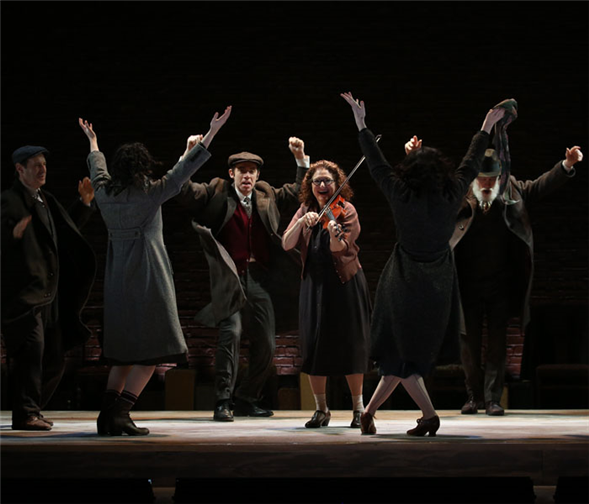Translate Page

Inside the score for this fevered take on history
---
By its very nature, klezmer music pulses with life, but for Aaron Halva, it has a haunted quality as well. "To me it really feels like when I listen to the blues or hear a banjo played really well, and I just start crying," he says. And for those of Eastern European heritage, he adds, "it's in their DNA, just as the smell of pasta and tomato sauce for some people makes them feel like they're at home. Klezmer makes you feel like you are somewhere, too. It beckons the ghosts."
How appropriate, then, that Halva and Lisa Gutkin are co-music directors and co-composers of the klezmer-inflected score for Paula Vogel's play Indecent, which is now on Broadway at the Cort Theatre. Steeped in the history of Yiddish theatre – and inspired by a particular, harrowing incident that persecuted Yiddish artists in New York City – the play is restless with spirits.
Co-conceived with Rebecca Taichman, who directs this production, Vogel's play centers on a troupe of Yiddish theatre artists who performed Sholem Asch's 1906 moral melodrama The God of Vengeance. In its original language, the play toured Europe and the Lower East Side to great success, but when it was translated into English and performed on Broadway in 1922, it was suddenly declared obscene. Scenes of same-sex attraction and feminine liberation were so controversial that the cast and producer were arrested.
Indecent charts the aftermath of that arrest, delivering a potent story about the power of art and the cost of taking a moral stand in a culture that denounces you.
And because this is a play by Paula Vogel, the story is told in a distinctly theatrical way. Sometimes supertitles reveal a character's inner thoughts. Sometimes Vogel's characters perform bits of Asch's earlier play. Most often, the score enlivens the story.
The musicians might "speak" by playing a line of music, or they might lead a rollicking rendition of a Yiddish folk song that concludes with a raucous dance. (Along with their original klezmer compositions, Gutkin and Halva have also orchestrated period tunes which Vogel chose.) No matter what, they add a sense of urgency to the production – a sense that these historical issues are still very much alive.
To that end, Halva and Gutkin – along with clarinetist Matt Darriau – are fully integrated into the show. They not only perform their music live on stage, but also have characters who participate in what's happening.
"I absolutely consider this my acting debut," says Gutkin. And it's been this way since 2015, when the play began at Yale Repertory Theatre. As Gutkin recalls, the music and musicians "organically" became more and more part of the Yiddish theatre troupe depicted on stage.
"Rebecca's idea was to have all of us in the same room at the same time, collaborating," she says. "That was very difficult at first because composers write at home, in their own little world. But in the end, we got to know the characters and piece so well."
Granted, both musician-composers have plenty of experience in front of a crowd: Gutkin is a Grammy Award-winning violinist, composer, and singer in the Klezmatics. Halva -- who plays accordion in Indecent -- has participated in commedia dell'arte productions by Christopher Bayes and is the leader of the Cuban music group Nu D'Lux.
"Paula and Rebecca always envisioned us as part of the on-stage show," says Halva, adding that the musicians were also given character names and back stories. (He plays Moritz Gadowski.)
"I'm Nellie Friedman," says Gutkin, "and the clarinetist's character is Meyer Balsom. Paula started to see in the first weeks of rehearsal that these people [the three musicians] are going to move around and will interact with the actors."
Plus, Halva says, "Rebecca would call you out if you weren't reacting to what was happening around you. You couldn't check out with your instrument like you could on a bandstand. You can't do that here."
As the show moved around the country – traveling from Yale to productions at California's La Jolla Playhouse and Off Broadway's Vineyard Theatre – the musicians' role continued to evolve. "If a song tilted too much in one direction it threw the balance off," Gutkin says. "If it commented too much or it didn't have the right tone, then you had a choice. You could either fill in more in the other direction to make the song work, or if that wasn't right, you could cut the song and something else went in."
Klezmer music connects to the show in the simplest of senses, she adds. "It is the authentic music of that time period with this troupe's story. But it also connects to emotions. The music juxtaposes fun and pain and all the things in life."
---
TDF Members: At press time, discount tickets were available to 'Indecent.' Go here to browse our current offers.
Follow Frank Rizzo at @ShowRiz. Follow TDF at @TDFNYC.
Photos by Carol Rosegg. Top photo: Lisa Gutkin (center, with violin) and the company of 'Indecent.'